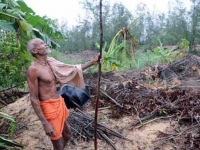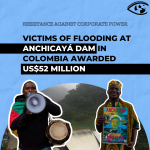Green Tribunal Weighs Multinational Projects in India

Two controversial multinational projects in Orissa, an eastern Indian state, face high level decisions in the next few weeks: a bauxite mine in the Niyamgiri hills planned by Vedanta of the UK and an iron and steel refinery in Jagatsinghpur being developed by POSCO of South Korea.
CorpWatch has reported on both in the past: the bauxite mine threatens the sacred hills of the Dongria Kondh people while the iron and steel refinery threatens traditional betel nut farmers.
As we noted last year, these two battles "encapsulate the chasm between two competing visions of how the second most populous country in the world should develop within the modern world. Jawaharlal Nehru, the country's first prime minister referred to dams and factories as the "temples of modern India," and his successors have gone cap-in-hand to international agencies such as the World Bank to fund major development projects such as the Narmada Valley Dams.
"Rural communities - with the help of city-based activist groups - have struggled to stop the mega-projects. They argue that the displacement of traditional communities, as well as the major environmental impacts of these projects, outweigh the financial benefits. The Narmada dams, for example, while generating electricity and irrigating great areas, would destroy villages and traditional farmland, displacing millions of people."
Vedanta went before the Indian Supreme Court today to appeal an August 2010 decision by the Indian environment ministry blocking the mine from going forward because of the impact on the indigenous community. The court adjourned without making a decision but justices K S Radhakrishnan and C K Prasad are expected to rule before the summer vacations. The court may refer the matter to the brand new National Green Tribunal which started hearing cases last year.
The Tribunal which was created in 2010 is "a specialized court with expert members having extraordinary powers to provide remedies to environmental problems."
One of the Tribunal's most significant decisions so far has been the suspension of POSCO's permit last week. The ruling was made when Prafulla Samantray, an activist from Bhoinagar, brought suit over the fact that a comprehensive environmental impact assessment (EIA) report was not done for the 12 million tonne production project. Ritwick Dutta, the lawyer for the activists, told CNN-IBN TV: "Strangely enough the environmental impact assessment studies (were) done only for a 4 million tonne project."
These two important cases will demonstrate whether or not the National Green Tribunal is up to the task of protecting local communities and the environment in India. Blocking either or both projects will not stop other multinational corporations from continuing to try to exploit the country, but it will surely give them pause in the knowledge that powers that be in New Delhi will listen to communities that organize and push back successfully against irresponsible development and human rights abuse.
As Dongria elder Dodhi Sikaka told Survival: "We are fighting for our own people, for our ancestral land, for Niyamgiri. Those who are fighting for their rights are beaten up and put behind bars. Now all we Dongrias are together in resisting this."
For a recent and very vivid description of what the Dongria Kondh face, see Bianca Jagger's latest. She notes: "According to the UN, companies have a responsibility to respect human rights wherever they do business. It is deplorable that local inhabitants should have to implore and appeal to the better nature of shareholders and company executives to protect their human rights, their homes and their livelihoods. Companies who violate this fundamental right should be held accountable in a court of law."
Adds Jagger: "In the 21st century, we need to redefine the meaning of "development." It must be sustainable. Any development project must take into account the needs and aspirations of the local communities, and should benefit all sectors of society."
- 116 Human Rights



